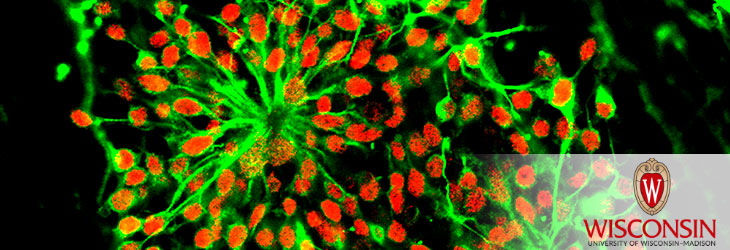Pluripotent Stem Cells

Albumin-Free Protocol Cuts Cost, Supports Large-Scale Cardiomyocyte Production
WARF: P150011US02
Inventors: Sean Palecek, Xiaojun Lian, Xiaoping Bao
The Wisconsin Alumni Research Foundation (WARF) is seeking commercial partners interested in developing a method of differentiating human pluripotent stem cells to cardiomyocytes in a chemically defined medium without albumin.
Overview
Generating cardiovascular cells from pluripotent stem cells holds profound promise for research and therapy, and the past 10 years have witnessed rapid methodological advances for creating de novo human cardiomyocytes. In particular, the ability of human pluripotent stem cells (hPSCs) to differentiate to cells in cardiac lineages has attracted significant interest, with a strong focus on in vitro modeling, drug discovery, safety pharmacology and cell therapy.
However, all existing protocols for differentiating hPSCs to cardiomyocytes use albumin, which increases cost and may introduce xenogenic components, limiting the potential for large-scale production. The use of recombinant albumin addresses some of these issues (e.g., batch-to-batch variability) but is prohibitively expensive at commercial scale.
Accordingly, there is a clear need for a new cardiac differentiation protocol that uses fully defined culture conditions without relying on albumin or other substances previously thought essential.
However, all existing protocols for differentiating hPSCs to cardiomyocytes use albumin, which increases cost and may introduce xenogenic components, limiting the potential for large-scale production. The use of recombinant albumin addresses some of these issues (e.g., batch-to-batch variability) but is prohibitively expensive at commercial scale.
Accordingly, there is a clear need for a new cardiac differentiation protocol that uses fully defined culture conditions without relying on albumin or other substances previously thought essential.
The Invention
UW–Madison researchers have developed a method for generating high yield, high purity cardiomyocytes/progenitors from PSCs under defined, albumin-free conditions. Their discovery that albumin is not necessary, and may even be deleterious, for cardiomyocyte differentiation dramatically reduces the cost of production.
Applications
- Inexpensive and reproducible generation of cardiomyocyte progenitors and cardiomyocytes from PSCs
Key Benefits
- Method is fully defined and xeno free.
- Efficient and cost effective
- Simplifies steps
- Facilitates translation to regenerative therapies
Stage of Development
For all lines tested (hESCs, iPSCs, transgenic line), the researchers generated 90-98 percent cTnT+ cells and yields of greater than 1x106/cm2 cardiomyocytes. The cardiomyocytes produced by the method are functional, maintain for more than eight months and produce mostly ventricular-type action potentials.
In addition to successful cardiomyocyte differentiation, the researchers showed that albumin blocks brachyury expression and that Wnt signaling activation induced by Gsk3 inhibitor treatment is more efficient in media lacking albumin.
In addition to successful cardiomyocyte differentiation, the researchers showed that albumin blocks brachyury expression and that Wnt signaling activation induced by Gsk3 inhibitor treatment is more efficient in media lacking albumin.
Additional Information
For More Information About the Inventors
Tech Fields
For current licensing status, please contact Andy DeTienne at [javascript protected email address] or 608-960-9857